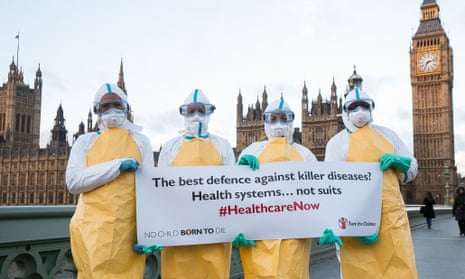Up to 30 countries are vulnerable to an Ebola-style epidemic, unless the world sits up and helps get urgent investment into universal healthcare, a report (pdf) has found.
Improving the health systems in the three Ebola-hit African nations would have helped to prevent the epidemic and cost a third of the relief effort, says Save the Children in a new investigation of the epidemic that has claimed more than 9,500 lives.
It found that £2.8bn had been spent on aid, compared with the £1bn it would have cost to improve basic healthcare in Sierra Leone, Liberia and Guinea.
It warned that Ebola was among the “high-profile threats that alarm the world”, not least because of the panic the virus sowed around the globe, but that countries, some poorer than the western African nations, suffer “a daily burden of death and disease” caused by lack of basic health facilities.
“A robust health system could have stopped Ebola in its tracks,” said the charity’s chief executive, Justin Forsyth.
“Without trained health workers and a functioning health system in place, it’s more likely that an epidemic could spread across international borders with catastrophic effects,” he added.
“Ebola … is a wake-up call that the world can no longer allow any country to continue with dangerously inadequate health services,” said Peter Piot, the director of the London School of Hygiene and Tropical Medicine, in a foreword to the report.
In its new report, A Wake Up Call: lessons from Ebola for the world’s health systems, Save the Children found that Liberia and Sierra Leone had made important progress in their health systems before Ebola hit.
The report’s analysis of health services in 75 countries shows that there are 28 countries with weaker health defences than Liberia. Its Health Access Index places Somalia at the bottom, Chad second to last and Nigeria, with the largest economy in Africa, third from the bottom with an “incredibly high level on inequality in access to health services”.
The variables the charity took into account include the number of health workers per 10,000 population, per capita government expenditure on healthcare, skilled attendance at childbirth, national mortality rate and the gap between the richest and the poorest.
It warns that with two new zoonotic diseases, which pass from animal to human, emerging every year, the risk of future multi-country outbreaks of infectious diseases is dangerously high for the global population.
The Ebola epidemic, which has caused more than 9,500 deaths so far, has highlighted the poor state of health infrastructure in the three countries.
Many large referral hospitals had no electricity and running water or have been made unsafe by fires and floods. Laboratories were few in number and lack of capacity to test blood helped the spread of the virus, it reports.
Save the Children also cited poor logistics in medical supplies. In September, for instance, 60,000 pairs of gloves were found stored in a central warehouse in Liberia while none were available in the health centres the warehouse supplied.
“While it appears the disease may finally be coming under control, we must learn the lessons from the crisis as a matter of urgency,” says the report.
A major part of the solution is taxation, a challenge in countries run on cash economies and with poor records of tax collection. It calls for domestic tax in these countries to equate to 20% of GDP and to allocate 15% of annual budgets to health systems.
Even then, simple per capita expenditure does not alone provide the solution, the report says.
It cites Sierra Leone as a country with one of the worst health indicators in the world, with total health spending per capita of $96 per head. This includes an individual’s “out of pocket” expenses for treatments and diagnoses such as X-rays and medicine.
By contrast, Rwanda, it notes, has much better health outcomes and coverage but spends less at $66 (£42.70) per head.
Rwanda is just one of just six African countries that allocates more than 15% of its budget to health. It also has a national health insurance system, subsidies for the poorest who turn to hospital for basic diagnostics and greater co-ordination in the aid community.
Even in Rwanda, which was ranked relatively comfortably at 21 out of the 75 countries it assessed, a key problem is shortage of health workers, training and retention of staff.
When Ebola struck, Liberia had only 51 doctors for the entire country – one for every 71,000 people compared to the UK, which has one for every 366 people. Sierra Leone has just over 100 doctors.
Save the Children also identified “leakages, corruption and fraud” as another factor weighing against the improvement of healthcare in poorer countries with much as 40% of health spending “wasted through inefficiencies”, which include corruption but also through the use of over-expensive drugs and the insufficient use of generic medicines, an inappropriate mix of health workers and unnecessary hospital admissions.
Cutting “wastage” by just 10% could raise $15bn.
Who controls the purse strings also makes a significant difference. “Crucially, it is the structuring of this funding, where it sits, who controls it and how it is spent, that makes the difference,” it says.
The experience in South Africa, India and Tanzania shows that transfers from central to devolved governments or targeted support can mitigate against inequalities, the report says.
World leaders will gather in Brussels on Tuesday for a finance conference on the next steps in the fight against Ebola.

Comments (…)
Sign in or create your Guardian account to join the discussion